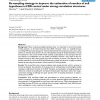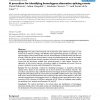5722 search results - page 1106 / 1145 » the future of experimental research |
BMCBI
2010
14 years 10 months ago
2010
Background: In cancer, gene networks and pathways often exhibit dynamic behavior, particularly during the process of carcinogenesis. Thus, it is important to prioritize those gene...
BMCBI
2007
14 years 10 months ago
2007
Background: When conducting multiple hypothesis tests, it is important to control the number of false positives, or the False Discovery Rate (FDR). However, there is a tradeoff be...
BMCBI
2007
14 years 10 months ago
2007
Background: The rapid burgeoning of available protein data makes the use of clustering within families of proteins increasingly important. The challenge is to identify subfamilies...
BMCBI
2008
14 years 10 months ago
2008
Background: A better understanding of the mechanisms involved in gas-phase fragmentation of peptides is essential for the development of more reliable algorithms for high-throughp...
BMCBI
2007
14 years 10 months ago
2007
Background: The study of the functional role of alternative splice isoforms of a gene is a very active area of research in biology. The difficulty of the experimental approach (in...


